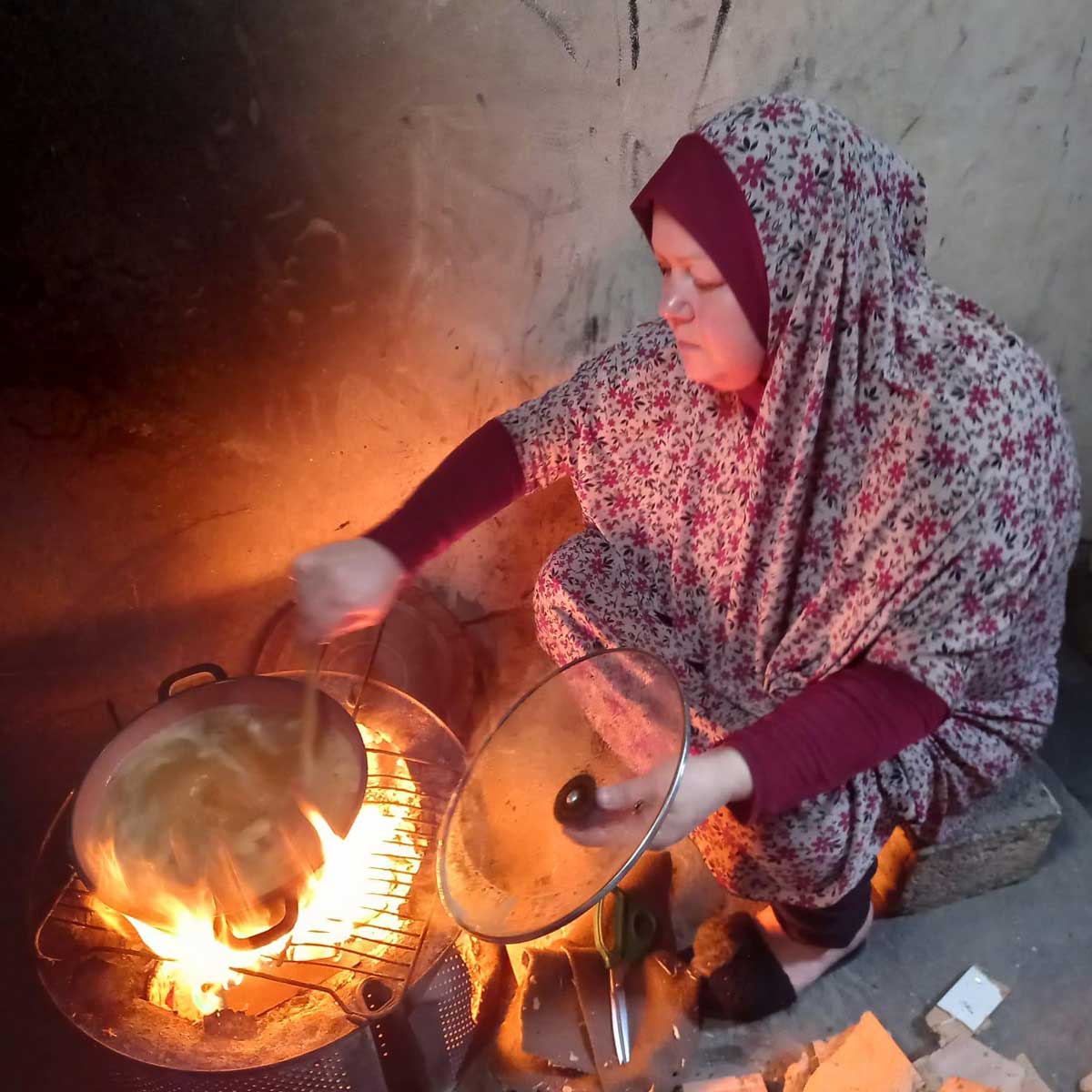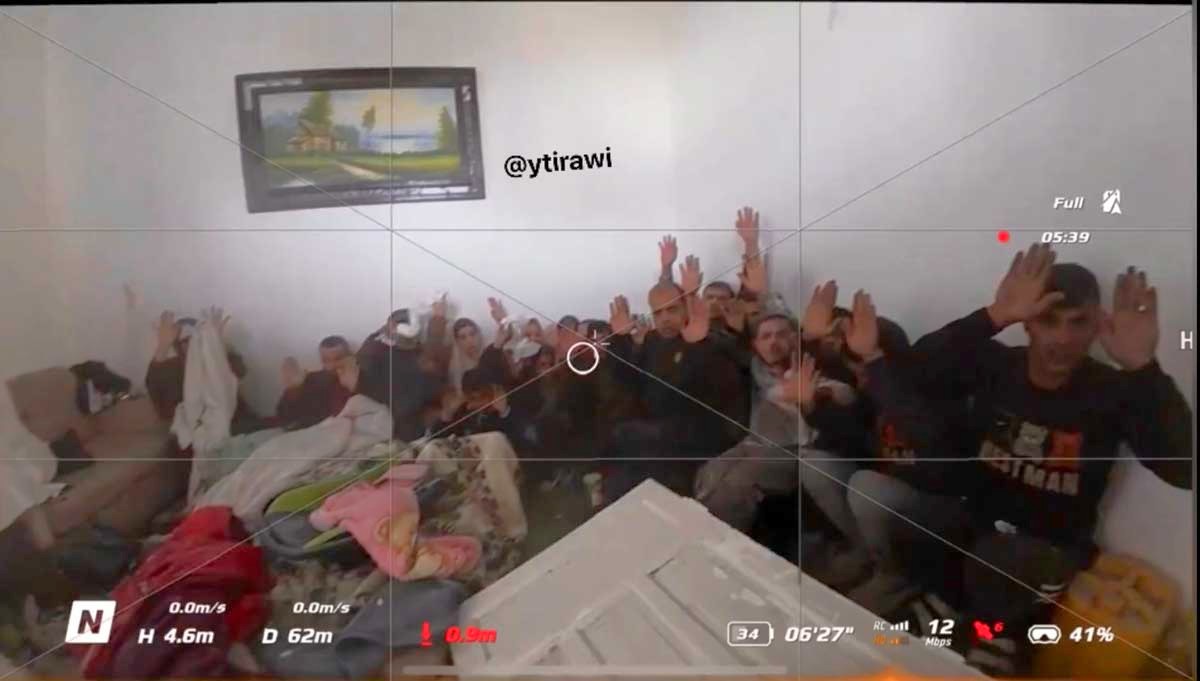A 48-year-old mother of eight from Gaza City, Firyal recounted how her family was displaced, her son killed in an airstrike, her husband and sons arrested, and her baby granddaughter nearly frozen to death in a year and a half of war
Until the war, my husband Samir Safi, 53, and I lived with our eight children—‘Ali, 31, Mahmoud, 30, Ahmad, 27, Muhammad, 26, ‘Abdallah, 23, Saleh, 16, Farah, 22, and Laila, 20—in a three-story building in the a-Sheikh Radwan neighborhood of Gaza City. My husband is a barber and used to run a barbershop on the ground floor of our building.
Even back then, our financial situation wasn’t good. Most of our children were unemployed because of the situation in the Strip, and only occasionally worked odd jobs. We got by mostly on my husband’s income from his barbershop. We kept going thanks to the hope that things would get better, with God’s help.

When the war began on 7 October 2023, we were shocked that the bombing was aimed directly at civilians’ homes, without any warning. They also dropped tons of bombs on mosques, schools, and streets, destroying them. We saw thousands of civilians—men, women, and children—who fled their homes near the eastern and northern borders of the Strip and headed toward central Gaza City. Some took shelter in schools.
Already on the second day of the war, warplanes dropped leaflets in our neighborhood ordering us to evacuate, claiming it was a combat zone, and threatening us with bombing and death.
The airstrikes got worse by the day, and the death toll rose to terrifying levels. We didn’t stay home long. A house belonging to the Kalub family was bombed right near ours—it had been full of displaced people, mostly women and children. More than 25 people were killed in the strike, and their bodies were thrown everywhere—in the street, on power lines, and on nearby rooftops. It was a massacre beyond words. At that moment, we decided we couldn’t stay home any longer. We packed a few belongings, took some supplies, and left—hoping to find a safe and quiet place.
We left around midday on 25 October 2023, along with a mass of other displaced people. On the way, a house on the main road in a-Sheikh Radwan was bombed and my son Mahmoud, 30, was killed. His wife was wounded in the head, and their two-year-old daughter was hit by shrapnel and lost her fingers.

We reached al-Hashimiyah School in a-Tufah neighborhood, near Salah a-Din Street. We stayed there for a whole month. Conditions were difficult—there was little food or water, it was freezing, and we were in constant fear. The bombing around us never stopped for a moment.
On 1 December 2023, a month after the end of the first ceasefire, the military began shelling the school indiscriminately, and tanks drew near. We fled without taking anything with us—we just wanted to save ourselves. As we ran, a shell hit the school gate and my husband, sons, and daughters were injured. Only God’s mercy saved us from death.
We headed toward a-Shuhada Street, near the Legislative Council building, and walked for hours looking for shelter. In the end, we entered an empty house on a-Shuhada Street—a two-story building that belonged to a Christian family who had fled south. There were about 20 of us there—my husband and children, my sister who is paralyzed from an accident 25 years ago, and other relatives. We stayed there for almost two months.
On the night of 29 January 2024, around 11:00 P.M., Israeli tanks surrounded the house. One tank was right by the gate, and then quadcopters began firing at us. The military ordered us not to come out. We were trapped in the house for a week, with just a little bread and a bit of water. We were starving the entire week and couldn’t sleep from fear and anxiety.
On 5 February 2024, at 10:00 A.M., bulldozers began destroying the wall around the house and then the house itself, while we were all sitting in one of the rooms on the first floor. The second floor was shelled and caught fire, and the flames spread and nearly reached us. We thought we would burn alive.
After that, the military sent a quadcopter into the house and used a loudspeaker to order us to raise our hands. The quadcopter filmed us. Then soldiers came in and forced us to strip. They separated the women from the men, took our ID cards, and started arresting the men: my husband Samir and my sons ‘Ali, Ahmad, ‘Abdallah, Muhammad, and two of their friends. The soldiers even used ‘Abdallah as a human shield—they forced him to accompany them as they searched the house and then to tie up the other men. Then they tied him up and arrested him too.
At 5:00 P.M., they ordered us—just the women, at gunpoint—to walk to southern Gaza along the coastline. We left without a single man, and along the way, quadcopters flew over us and gave instructions over loudspeakers, telling us to leave the main road and walk along the shoreline.
We walked for two days. I have diabetes and high blood pressure, and my sister is in a wheelchair. At night we slept on the beach, shivering with cold, hungry and thirsty. My daughter’s baby was just five months old. She nearly froze to death. We tried to keep her alive using the heat of our bodies.
Along the way, we saw dozens of bodies—women, children, men—lying on the beach, with dogs feeding on them. Some of the corpses had disintegrated from the saltwater. Quadcopters hovered overhead the whole time.
On the morning of 7 February 2024, around 7:00 A.M., we reached Nuseirat Refugee Camp in the central Gaza Strip. We collapsed. Kind people carried us on a cart to Shuhada al-Aqsa Hospital, where we were treated and given food and clothing. The next day, we were moved to a displacement camp near the hospital, and we stayed there. Three months later, on 5 May 2024, my husband and my son Muhammad were released and rejoined us. Three of my sons are still in custody.
We stayed in the displacement camp until the ceasefire. The conditions were appalling—there was no food or water, apart from what we got from soup kitchens or kind strangers. We had no income.
When the ceasefire was announced on 19 January 2025, we walked back to the a-Sheikh Radwan neighborhood the next day—because cars weren’t allowed. We found our home completely destroyed. We were homeless. We were given a tent and lived there with dozens of other displaced people, with shared toilets and barely any water for drinking or washing. We got food from local soup kitchens: peas, beans, canned goods, bread.
When the crossings closed on 2 March 2025, a severe shortage began. There were no canned goods left. The food supplies dwindled. We started chasing after meals from one soup kitchen to the next, just to get a plate of beans or rice. Meat or chicken, which was already scarce, became non-existent. It’s been more than 45 days since any aid came in, and the hunger is getting worse.
My husband goes out every day to look for food—mujadara, rice, beans. Just to keep us alive. He also looks for water for drinking, washing, and cleaning. We only manage to bathe about once every three weeks, when there’s enough water.
Since the airstrikes started again, things have only gotten worse. It’s hard to move around, hard to look for food and water, everywhere is dangerous. We live in fear, hunger, and constant stress. All we think about is how to get something to eat and drink. There’s no transportation, no fuel, no money. The situation is getting worse every day.
We’ve been humiliated to the depths of our souls—under siege, starvation, and poverty. We are fighting for one basic right: to live.
* Testimony given to B'Tselem field researcher Muhammad Sabah on 26 April 2025